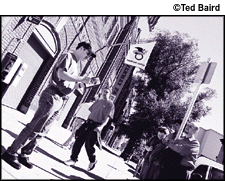The Boston Phoenix
September 21 - 28, 2000
![[Features]](/standard/image/headers/features_header.gif)
A writer's journey
Neal Pollack has achieved more by age 30 than most writers do in a lifetime. Now he faces a new challenge: selling his book.
by Chris Wright
It's not every day you get to interview a bona fide literary legend. Sometimes you have to make do with the likes of Neal Pollack. Not that Pollack isn't a celebrity in his own right. As a highly popular columnist for McSweeney's -- the satirical magazine published by ex-Might frontman Dave Eggers -- Pollack is, as one reporter puts it, the "hip guy du jour." Indeed, this guy's jour has most certainly arrivé.
This month, after a mere handful of issues as a funny-yet-brainy quarterly, McSweeney's will branch out into book publishing with The Neal Pollack Anthology of American Literature, a collection of essays. By taking his book to McSweeney's instead of to a traditional publisher, Neal Pollack is becoming a literary pioneer, sailing into the unknown like a book-world Marco Polo. He also hopes the journey will make him filthy rich.
"Mr. Pollack will receive 100 percent of the profits from his book," explains a note on the McSweeney's Web site. "This is the way we will be doing our book publishing." But then the McSweeney's people -- who have been called "the prankster monkeys of American letters" and "this little po-mo literary crowd" -- aren't known for abiding by convention.
One recent afternoon, Pollack read to a small and sweaty audience outside Fenway Park, his crisp oration punctuated by cries of "Got tickets?" and "Need tickets?" The previous night, he had performed before a full house at the Coolidge Corner Theatre. After a preliminary program that felt more like vaudeville than a literary event (not one, but two guitars were smashed on stage), Pollack bounded in wearing a silver Ziggy Stardust jacket, leapt on to the stage, and began to read: "If there is one rule in writing, it is this: I am the best."
This statement sets the tone for the rest of The Neal Pollack Anthology of American Literature, which makes no bones about the author's many accomplishments. Indeed, the book portrays a life full of glamour, adventure, erudition, and raw sex. Pollack, 30, tells tales of sparring with Richard Nixon and dining with Salman Rushdie. He recalls his award-winning articles about the Gulf War and poverty in Albania; his affairs with Brooke Shields and Madonna; his time as editor of the New Yorker.
Given his illustrious background, Pollack is a remarkably egalitarian writer. In a piece called "I Am Friends with a Working-Class Black Woman," he fondly recalls the time a prestigious magazine assignment resulted in an unexpected friendship and moments of real epiphany: " `It must be hard not to have a stove,' I say to old Cora. `Yeah,' she chuckles. `It makes it awful hard to cook.' "
After lengthy negotiations, Neal Pollack agreed to speak with the Phoenix over coffee and Cokes at a Boston sub shop.
Q: Hello.
A: Hello.
Q: Um, if you were an animal, what would you be?
A: I was at the Lincoln Park Zoo in Chicago once giving a reading. I saw these tapirs, and they had these enormous distended penises that just burst out of them, half the size of the animals themselves. The way they flopped around on the ground, I thought, Man. And the ardor they displayed with each other reminded me of the way I am around my lovers. I would almost certainly be a tapir.
[Long pause]
Q: So, you have a book out.
A: I do.
Q: What's it called?
A: It's called The Neal Pollack Anthology of American Literature.
Q: Is it any good?
A: That's a really stupid question. If you'd read any of my other books, you would know that not only is it good, it's a breathing history of American literature in the last 60 years. So to ask whether it's good or not is simplistic. To ask whether it's definitive -- which it is -- is probably more apt.
Q: How many books is that for you now?
A: Forty-five. Well, 40 plus five volumes of poetry -- which aren't really books, more like jottings, but they're still very good.
Chris Wright can be reached at cwright[a]phx.com.

